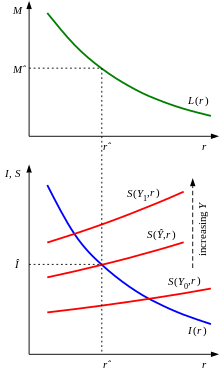What does keynesianism mean?
Definitions for keynesianism
key·ne·sian·ism
This dictionary definitions page includes all the possible meanings, example usage and translations of the word keynesianism.
Princeton's WordNet
Keynesianismnoun
the economic theories of John Maynard Keynes who advocated government monetary and fiscal programs intended to stimulate business activity and increase employment
GCIDE
Keynesianismadjective
the macroeconomic theories and politico-economic policies of British economist John Maynard Keynes (1883-1946) and his followers; -- used especially in reference to their advocacy of governmental action to maintain low unemployment through government spending. See Keynes.
Wiktionary
Keynesianismnoun
A prescriptive or normative economic stance according to which the state should actively stimulate economic growth and improve stability in the private sector through interest rates, taxation and public projects.
Etymology: Named after John Maynard Keynes.
Wikipedia
keynesianism
Keynesian economics ( KAYN-zee-ən; sometimes Keynesianism, named after British economist John Maynard Keynes) are the various macroeconomic theories and models of how aggregate demand (total spending in the economy) strongly influences economic output and inflation. In the Keynesian view, aggregate demand does not necessarily equal the productive capacity of the economy. Instead, it is influenced by a host of factors – sometimes behaving erratically – affecting production, employment, and inflation.Keynesian economists generally argue that aggregate demand is volatile and unstable and that, consequently, a market economy often experiences inefficient macroeconomic outcomes – a recession, when demand is low, or inflation, when demand is high. Further, they argue that these economic fluctuations can be mitigated by economic policy responses coordinated between government and central bank. In particular, fiscal policy actions (taken by the government) and monetary policy actions (taken by the central bank), can help stabilize economic output, inflation, and unemployment over the business cycle. Keynesian economists generally advocate a regulated market economy – predominantly private sector, but with an active role for government intervention during recessions and depressions.Keynesian economics developed during and after the Great Depression from the ideas presented by Keynes in his 1936 book, The General Theory of Employment, Interest and Money. Keynes' approach was a stark contrast to the aggregate supply-focused classical economics that preceded his book. Interpreting Keynes's work is a contentious topic, and several schools of economic thought claim his legacy. Keynesian economics, as part of the neoclassical synthesis, served as the standard macroeconomic model in the developed nations during the later part of the Great Depression, World War II, and the post-war economic expansion (1945–1973). It was developed in part to attempt to explain the Great Depression and to help economists understand future crises. It lost some influence following the oil shock and resulting stagflation of the 1970s. Keynesian economics was later redeveloped as New Keynesian economics, becoming part of the contemporary new neoclassical synthesis, that forms current-day mainstream macroeconomics. The advent of the financial crisis of 2007–2008 sparked renewed interest in Keynesian policies by governments around the world.
ChatGPT
keynesianism
Keynesianism is an economic theory that is based on the ideas of British economist John Maynard Keynes. It proposes that governments can stabilize the economy and promote economic growth by managing the level of demand through government spending and taxation, enabling intervention during periods of economic recession and boom. The theory asserts that a mixed economy, where both the state and the private sector play a role, can lead to prosperity and stability. This approach runs counter to classical economics which advocates for limited government intervention in the economy.
Matched Categories
Numerology
Chaldean Numerology
The numerical value of keynesianism in Chaldean Numerology is: 9
Pythagorean Numerology
The numerical value of keynesianism in Pythagorean Numerology is: 9
Popularity rank by frequency of use
Translation
Find a translation for the keynesianism definition in other languages:
Select another language:
- - Select -
- 简体中文 (Chinese - Simplified)
- 繁體中文 (Chinese - Traditional)
- Español (Spanish)
- Esperanto (Esperanto)
- 日本語 (Japanese)
- Português (Portuguese)
- Deutsch (German)
- العربية (Arabic)
- Français (French)
- Русский (Russian)
- ಕನ್ನಡ (Kannada)
- 한국어 (Korean)
- עברית (Hebrew)
- Gaeilge (Irish)
- Українська (Ukrainian)
- اردو (Urdu)
- Magyar (Hungarian)
- मानक हिन्दी (Hindi)
- Indonesia (Indonesian)
- Italiano (Italian)
- தமிழ் (Tamil)
- Türkçe (Turkish)
- తెలుగు (Telugu)
- ภาษาไทย (Thai)
- Tiếng Việt (Vietnamese)
- Čeština (Czech)
- Polski (Polish)
- Bahasa Indonesia (Indonesian)
- Românește (Romanian)
- Nederlands (Dutch)
- Ελληνικά (Greek)
- Latinum (Latin)
- Svenska (Swedish)
- Dansk (Danish)
- Suomi (Finnish)
- فارسی (Persian)
- ייִדיש (Yiddish)
- հայերեն (Armenian)
- Norsk (Norwegian)
- English (English)
Word of the Day
Would you like us to send you a FREE new word definition delivered to your inbox daily?
Citation
Use the citation below to add this definition to your bibliography:
Style:MLAChicagoAPA
"keynesianism." Definitions.net. STANDS4 LLC, 2024. Web. 26 Apr. 2024. <https://www.definitions.net/definition/keynesianism>.



Discuss these keynesianism definitions with the community:
Report Comment
We're doing our best to make sure our content is useful, accurate and safe.
If by any chance you spot an inappropriate comment while navigating through our website please use this form to let us know, and we'll take care of it shortly.
Attachment
You need to be logged in to favorite.
Log In